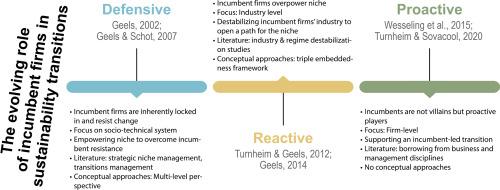Defensive, reactive, or proactive? A critical review and conceptual framework of the role of incumbent firms in sustainability transitions
IF 7.4
2区 经济学
Q1 ENVIRONMENTAL STUDIES
引用次数: 0
Abstract
This research addresses the literature on incumbent firms in sustainability transitions and makes two main contributions. First, it critically identifies and synthesises the diverse roles of incumbent firms: as defensive actors who resist change, reactive actors who respond to destabilising conditions, and proactive actors who have a stake in the change. It elaborates on each of these roles, their conceptual approaches, transition pathways, and the implications for ongoing research on incumbent firms. Second, based on this review, it introduces a conceptual model of an incumbent firm's dynamic and iterative interaction with sustainability transitions, arguing for the role of time and temporal dynamics in addition to the readiness of a firm's internal and external environments. This conceptual model introduces an incumbent firm's perspective on sustainability transitions and thus bridges the gap between the firm (micro level) and the socio-technical system (macro level) in the emerging research.

防御,被动,还是主动?对现有企业在可持续性转型中的作用的批判性审查和概念框架
本研究对现有企业在可持续性转型中的研究文献进行了梳理,并做出了两个主要贡献。首先,它批判性地识别和综合了现有企业的不同角色:作为抵制变革的防御性参与者,作为对不稳定条件做出反应的被动参与者,以及作为在变革中拥有利益的主动参与者。它详细阐述了这些角色、它们的概念方法、过渡途径,以及对现有企业正在进行的研究的影响。其次,在此综述的基础上,引入了现有企业与可持续性转型的动态和迭代互动的概念模型,论证了除了企业内部和外部环境的准备之外,时间和时间动态的作用。这一概念模型引入了现有企业对可持续性转型的看法,从而弥合了新兴研究中企业(微观层面)和社会技术系统(宏观层面)之间的差距。
本文章由计算机程序翻译,如有差异,请以英文原文为准。
求助全文
约1分钟内获得全文
求助全文
来源期刊

Energy Research & Social Science
ENVIRONMENTAL STUDIES-
CiteScore
14.00
自引率
16.40%
发文量
441
审稿时长
55 days
期刊介绍:
Energy Research & Social Science (ERSS) is a peer-reviewed international journal that publishes original research and review articles examining the relationship between energy systems and society. ERSS covers a range of topics revolving around the intersection of energy technologies, fuels, and resources on one side and social processes and influences - including communities of energy users, people affected by energy production, social institutions, customs, traditions, behaviors, and policies - on the other. Put another way, ERSS investigates the social system surrounding energy technology and hardware. ERSS is relevant for energy practitioners, researchers interested in the social aspects of energy production or use, and policymakers.
Energy Research & Social Science (ERSS) provides an interdisciplinary forum to discuss how social and technical issues related to energy production and consumption interact. Energy production, distribution, and consumption all have both technical and human components, and the latter involves the human causes and consequences of energy-related activities and processes as well as social structures that shape how people interact with energy systems. Energy analysis, therefore, needs to look beyond the dimensions of technology and economics to include these social and human elements.
 求助内容:
求助内容: 应助结果提醒方式:
应助结果提醒方式:


